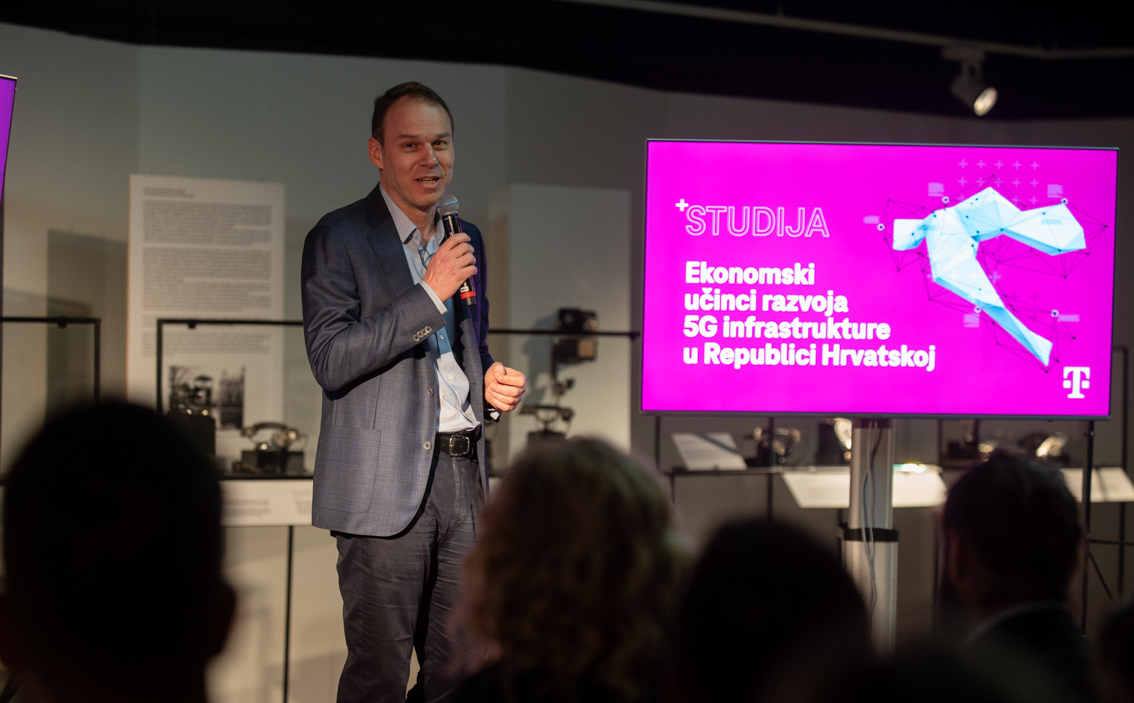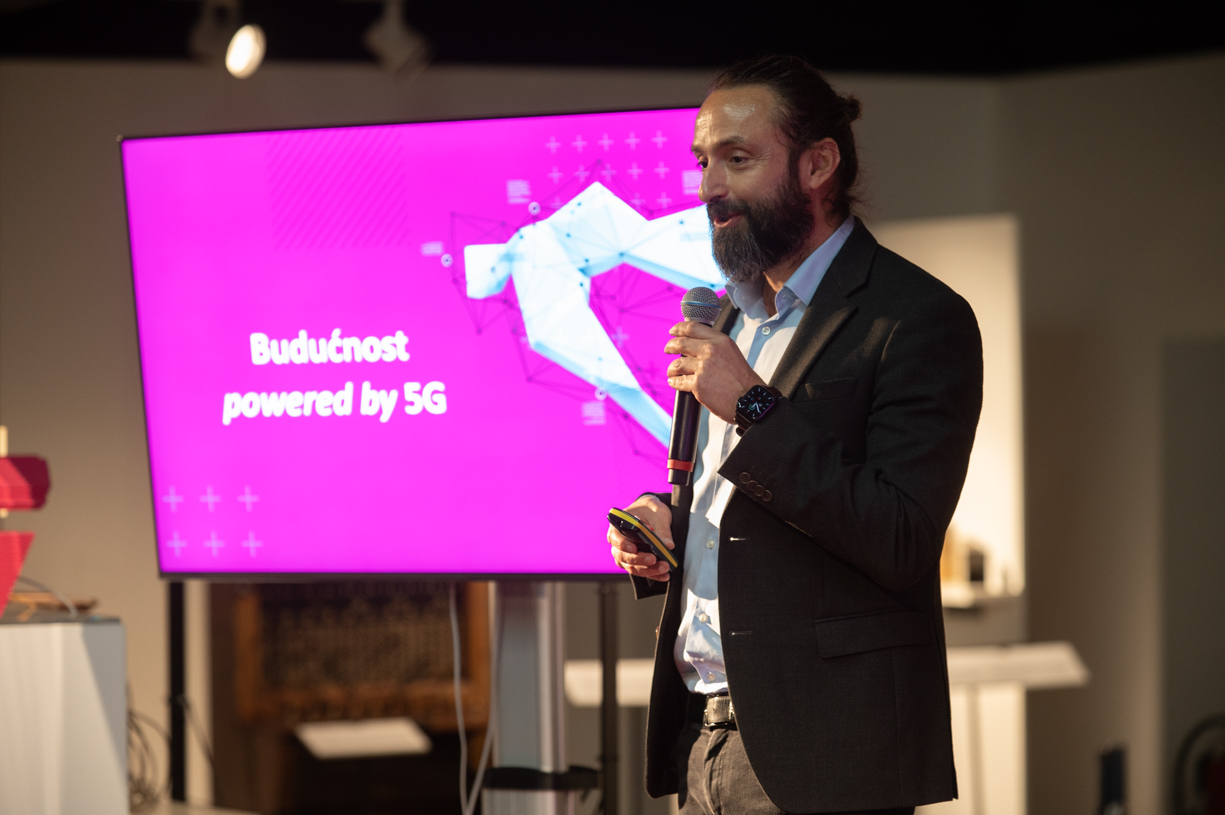20.4.2022
5G will bring more than 10 billion kuna to the Croatian economy, with positive effects through all industries and counties
- 5G network will accelerate market development, increase competitiveness, employment and encourage the development of all, especially currently less developed regions
- The annual net benefit of investing in 5G is estimated at 1.72% of GDP
- Hrvatski Telekom is the largest investor in digital infrastructure with continuous annual investments of more than HRK 1.6 billion a year

'5G Atlas - Economic effects of 5G infrastructure development in the Republic of Croatia' study shows that investments in the development of the 5G network in the next few years will create more than 10 billion kuna (1.33 billion EUR) of added value for the Croatian economy, with the annual net benefit from investing in 5G estimated at 1.72% of GDP. The study was created in cooperation between Hrvatski Telekom and the Economics Institute Zagreb.
'5G Atlas' confirmed that the development of 5G infrastructure is one of the key drivers of economic growth and social progress in all counties. Even more, the implementation of the 5G network opens up the doors for significant entrepreneurial potential, which is especially evident in less developed regions and sub-urban regions with 5G technology supporting the positive transformation of the economy across Croatia enabling them to be more productive and utilize the growth potential in the future.
According to moderate estimates, the introduction of the 5G network will result in a 20 to 50% increase in revenue, a 10% increase in export sophistication, a 10% reduction in operating costs, and a threefold increase in the potential for starting new businesses. At the same time, employment growth in all analyzed sectors will range from 8% in the manufacturing to 46% in the ICT industry.
The biggest positive effect on the export products sophistication is in agriculture, by as much as 25%, in the processing industry it’s 19% and in ICT by 7%. Agriculture will have the greatest effect in the context of reducing operating costs, by as much as 30%. The increase in the share of new business entities by counties will range from 25% in Zagreb to as much as 250% in Brodsko-posavska County, with the biggest winners here being the ICT and tourism sectors. The increase in exports will be most evident in less developed counties with growth in export products of 20 to 120%.
The ratio of benefits and costs of investing in 5G infrastructure differs significantly by counties due to differences in their economic structure that determines the potential for benefits, with eight counties showing higher benefits than the national average (3.0); City of Zagreb (4.5), Bjelovarsko-bilogorska (4.2), Koprivničko-križevačka (4.1), Međimurska (3.8), Osječko-baranjska (3.7), Istarska (3.4), Vukovarsko-srijemska (3.2) and Virovitičko-podravska counties (3.1).
Some regions are in a better position to achieve the positive effects of the 5G network and its application of technologies, with the development oriented zoning plans as well as more efficient and faster legislative processes for building 5G networks being of great importance to all sectors, all cities and counties, allowing them to take full advantage of 5G potential.
“In just a year and a half since we launched the first 5G network in Croatia, we have managed to cover 76 cities and make 5G available to more than 2 million citizens, with a million of them already able to enjoy gigabit speeds. All this progress was realised during the period when, contrary to market trends and despite the unfavorable business environment we accelerated our investments in both fiber and 5G, which helped the country to jump by 5 places in the DESI connectivity index. These investments and developments around 5G's expansion, including the ones planned for the near future are effectively providing the platform for the country's economic development and societal progress. With 5G networks significantly increasing the digitisation levels and providing new and exciting possibilities there is no single industry or part of our life that will not be positively affected by the 5G revolution. As the leading digital infrastructure investor in the country we will continue investing in the country’s future economic and social prosperity, hopeful that the investment friendly framework allows our investments in digitalization and 5G to reach their full potential”, stated Kostas Nebis, Hrvatski Telekom, CEO.
Bjelovarsko-bilogorska county has the greatest potential to increase the share of new business entities by introducing a 5G network, by as much as 3.5 times, and the potential of more than 3.1 times is in Koprivničko-križevačka, Virovitičko-podravska, Vukovarsko-srijemska, Požeško-slavonska, Osječko-baranjska and Zadarska counties. The highest potential for increasing the export sophistication of products is in Virovitičko-podravska county, by 1.66 times, and more than 1.5 times increase in export sophistication of products is in Karlovačka and Bjelovarsko-bilogorska counties. In terms of cost competitiveness, the biggest effect is in Karlovačka county (1.18 times), Sisačko-moslavačka (1.07 times), Vukovarsko-srijemska (1.04 times) and Bjelovarsko-bilogorska counties (1.02 times). The City of Zagreb, on the other hand, will see the greatest effect on the increase in total sales revenues, export revenues and total employment, where due to its size and economic strength, this effect is almost twice as large as in other counties.

“The introduction of the 5G network has the potential to increase market dynamics, improve cost competitiveness and sophistication of the domestic economy and lead to redistributive effects of economic activity among Croatian regions. Croatia has many times more benefits from the introduction of 5G network than the costs of development of this infrastructure, which is why it is crucial that all stakeholders - business and public sector, ministries, counties, local government units, actively participate in creating the environment that will enable 5G to use its potential which is in the interest of the economy and society. Especially bearing in mind that with the growing complexity of the economy the positive economic effects of the development of 5G infrastructure further strengthen”, said Maruška Vizek, Economics Institute Zagreb senior research fellow and head of research for this study.
The ‘5G Atlas’ also presents projects for the use of smart technologies developed by Hrvatski Telekom across Croatia. City ofDubrovnik, for example, was the first in the world with the largest smart parking project on the NBIoT network, within which more than 1,900 parking sensors were installed in the entire city. Also, the port of Dubrovnik, schools and kindergartens are equipped with sensors for measuring air quality, and the city has implemented the equipment for the traffic congestion zone.
With the Faculty of Electrical Engineering and Computing, a project is being developed to monitor and analyze traffic flows on public roads using drones in real-time. The development of this project on 5G technology will increase traffic safety and fluidity through the analysis of traffic jams and smarter traffic management in cities, checking available parking spaces, analysis of public transport load and providing a number of other useful options.
The pilot project of the company Kutjevo, in which Alti Agro, TIS Group and Orqa also participate, is working on collecting data from vineyards through recordings with multi-spectrum cameras on drones and on processing large amounts of data in real-time. Based on these images, it is possible to determine the existence of potential problems such as the possible occurrence of diseases or pests, lack of fertilizers or the need for irrigation.

“Behind us is the extremely successful first phase of the introduction of 5G technology in Croatia, within which we covered more than half of the population with 5G signal. We also provided users with up to five times faster mobile internet access and showed multi-gigabit data transfer speeds based on mmWave technology. In order to realize the full potential of 5G technology, it is necessary to continue working on its further expansion through the implementation of new frequency layers, new access points, new functionalities and elements in the core network. Therefore, it is extremely important to create favorable investment conditions that will amortize the unfavorable rise in electricity prices and the inflation impact and to have a legal framework for unhindered development of electronic communications infrastructure. It is also important to make the most of the available EU funds by utilizing them for systematic implementation of 5G in the economy”, concluded Boris Drilo, HT’s CTIO.
Whether it’s smart cities, digital agriculture, advanced medicine, future education or more efficient production, the 5G network is due to its broad applicability an integral part of every modern country and all transformative business models, as all sectors and industries will experience tangible benefits from 5G.